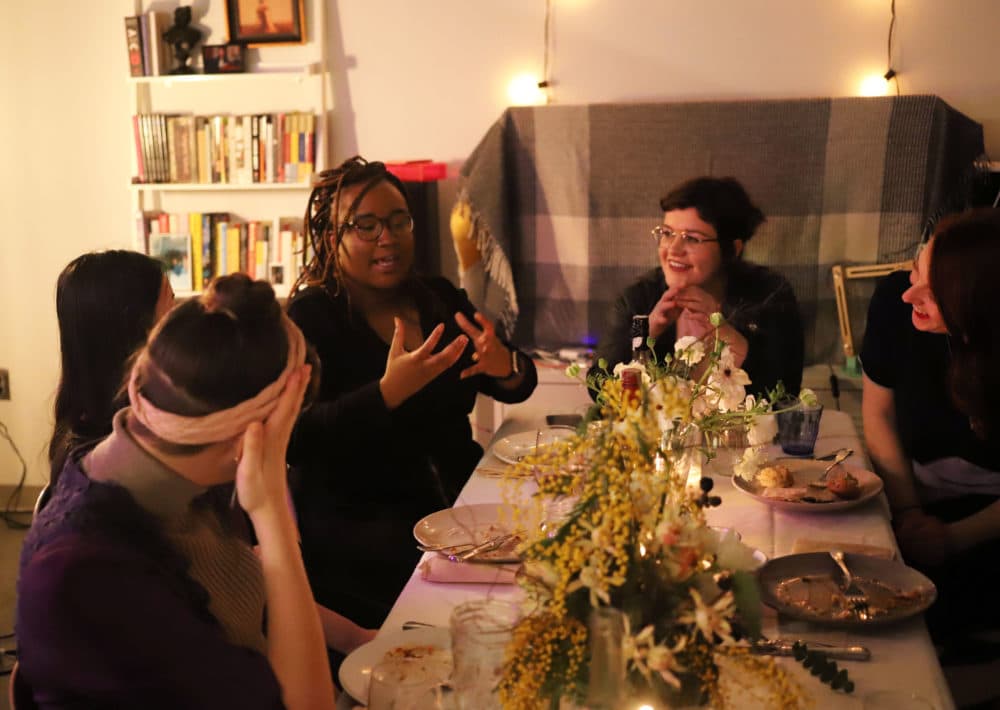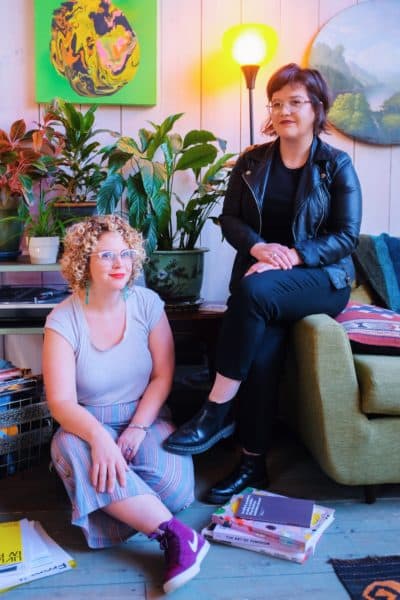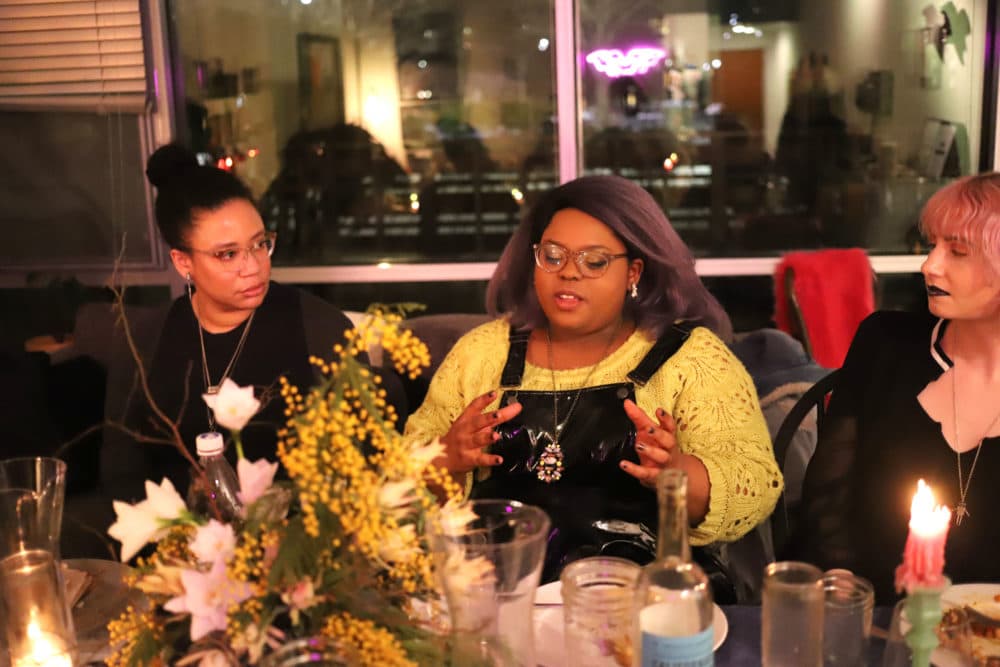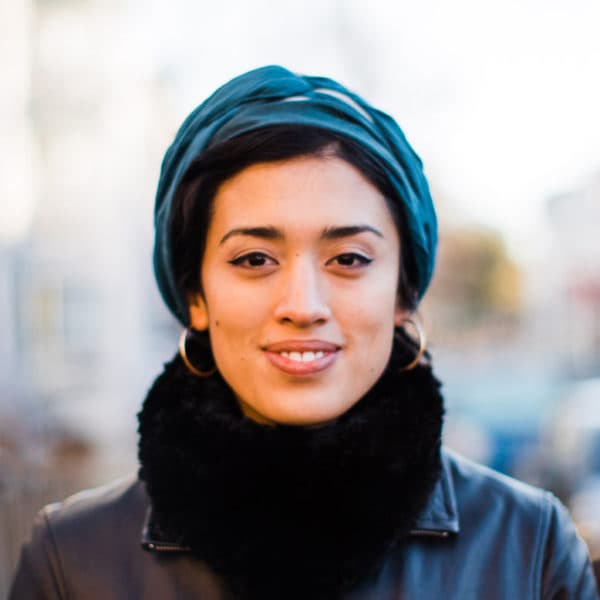Advertisement
How The Cauldron's Dinner Parties Are Fostering An Intentionally Feminist Community

There is an art to hosting a dinner party. Food, guests, conversation, intimacy — every dinner party is an assemblage of these ingredients, created out of the simple need to gather with others. But what makes shared time meaningful?
For The Cauldron — an online and in-person feminist community that offers communal dinners and meetups across Boston — dinner tables are an integral piece of feminist lineage. Around them, they gather feminists from different walks of life in the hopes that sharing space will ignite new insights and alliances.

Carlie Febo and Kate McBride founded The Cauldron a year ago. The name is a dual reference. “Cauldron” is the term for a group of bats. It is also a key component of witchcraft, which is currently making a comeback as a feminist symbol after a long history of being used to silence women. This layered appellation is both a reclamation of narratives of oppression and a celebration of the collective work of movement building.
“It's not about a single person,” says co-founder Febo, “It's that The Cauldron exists because it's a group, because it's so operative and collaborative.”
Febo and McBride met at the Institute of Contemporary Art in 2015. Febo was working in Teen Programs and McBride in marketing. They bonded over a shared interest in the intersection of social equity and the arts.
As an experiment, they began to host informal lunches with female museum workers to talk about salary negotiation. The lunches brought together previously siloed coworkers, stirring up excitement and camaraderie. Boston, they realized, needed more spaces like that.
“The patriarchy keeps us separate from each other to maintain power, and in the group we come together and share these experiences,” says McBride. “I think it creates a platform where change can happen.”
The potluck suppers last about five hours. Like any other party, it starts with mingling. What's different is how the guests are invited. Everyone there has seen the same post on Instagram. That post directed them to a Google form, where they applied for an invite. Febo and McBride use the application information to select 12 to 15 guests. They say they try to gather a diverse group in which no one knows each other.
Once everyone has arrived, Febo and McBride lay down the ground rules. Guests are advised to speak in what they call “I statements” — a style of communication that focuses on a person’s experiences and feelings, as opposed to judgments they may have about others. Febo and McBride’s other guidelines include: “Don’t yuck someone’s yum” and “If it’s not intersectional, it’s not good enough.”
From there, each person is given a turn to speak in the format of rose, bud, thorn. It’s an ice breaker where each person shares personal anecdotes about struggles, growth and abundance. The groups talk about a wide range of topics, discussing queerness, relationships, work, mental health, race, sexual violence and more. The conversation winds down into milder topics over dessert, when guests just socialize. Before they leave, Febo and McBride give them small gifts and access to a private Facebook group where they can continue their conversations.

And the conversations do continue. The Cauldron is not just a series of networking events to facilitate one off interactions for financial or professional gain. Febo and McBride say that The Cauldron is closer to a hub of personal and professional resources built from encounters between people, who despite sharing similar outlooks, were divided by their networks.
The benefit to participants is meant to bridge personal and professional needs. Febo says that guests have shared that “they feel that they can turn to The Cauldron for support, question, or concern, or even something that they are really excited about to celebrate.”
What are some of the conversations circulating in The Cauldron’s online community?
Febo says people have opened up about sexual assault experiences, dealing with racism in the workplace, and even practical matters like legal help for confronting a troublesome landlord. The connections are social as well. “We've had, 'Hey, I'm throwing this event this weekend like we'd love to see some of you there,' ” says Febo, smiling.
So far, The Cauldron has hosted 18 events and served 500 people. Febo and McBride believe they are on to something important and fulfilling — a need among self-identified feminists to connect on deeper levels. That’s why they are beginning to do more — even outside of Boston. They have plans to host workshops, reading circles and dinners in other cities.
Looking to the future, The Cauldron is determined to address the needs of its participants. As Febo puts it, she hopes each person who enters their community, feels “held and seen.”
